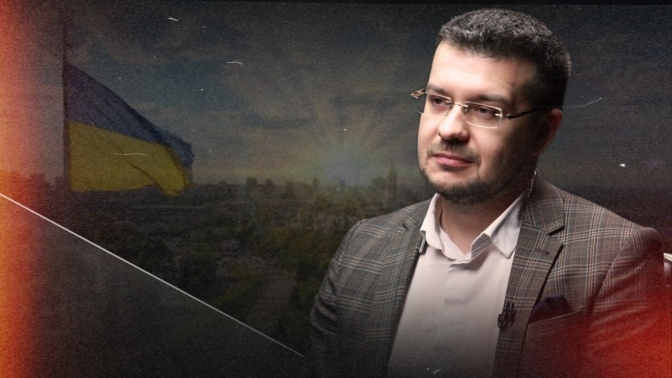
[For daily insights from throughout Ukraine, follow Ukrainian Freedom News on Telegram]
Is there still a lot of work to do with the de-Russification of Kyiv and is this how you label it for yourself?
These are the terms we use. I would obviously reject them because, in the concept of de-Russification, there is a hidden reality that Rus’ and rus’ke [what belongs to Rus’] are ours. Those who love Lviv know that in the last third of the 14th century, silver coins were minted in Lviv with the inscription «moneta russie», a rus’ka coin. We all understand very well that «rus’ke» is an adjective. Undoubtedly, the princes ruled the Rus’, Kyiv was the Rus’ capital, but who were the Rus’ki people? Our ancestors were called Rus’ in the plural, and Rusyn in the singular. Rus’ki were our serfs who lived on the periphery, and who, let’s say, had the status of slaves of our state.
But let’s return to the situation with de-Russification. It is clear why we now understand one thing by this term. There is a term «decommunization» that we lived with in the 1990s and 2000s, which still hasn’t ended. I understand it, as well as the term «de-Sovietization». But I do not understand the term «decolonization», which has now become very fashionable. Some «monkeys» decided that if the UN recognized that some countries, former colonies, have the right to ask for money from their metropolises, then we should also position Ukraine as a state that was a Russian colony empire, and perhaps gain something from it. These are some fools and beggars, as it’s said, who decided it.
In short: why does this anti-colonial approach not work with Ukraine? It is something that could connect us with Africa and Latin America – if we wanted it, of course.
If we talk about a colonial past, then, accordingly, we remove everything related to our colonizer through the processes of decolonization. So, first we have to decolonize the academician of the Russian Imperial Academy of Sciences, Taras Shevchenko, or the first round-the-world Ukrainian traveller who lived in the Russian Empire – officer Yurii Lysyanskyi. But everyone else will follow Shevchenko: Mykola Gogol, or the grandson of a serf from the Poltava province Anton Chekhov – everyone, including your ancestors and mine, who in any way reached the rank of corporal or some other. In this context, you and I must be absolutely sure that now these evil-doers want to introduce a policy of decolonization in our country. But Ukraine cannot be a colony of Russia. We really fell under its influence, and then we were not captured, and purely due to legal cases, [Ukraine] became part of the Russian Empire. But just as an Australian aborigine does not teach an English writer to write, so we cannot recognize ourselves as a colony, because we taught them to write, count, think, and speak in this artificial language.
Therefore, we must use the term «de-imperialization», because in case it’s implemented, we will leave Shevchenko, who was an academician of the Russian Imperial Academy of Sciences and a Ukrainian, as well as Gogol, Chekhov, and many other people who, one way or another, had to work within the empire, as it was in the French, German, Austrian-Hungarian empires. When Hungarians and Slovaks worked in the Austrian Empire, they gave themselves and their talent for their homeland. Or it’s the same when we talk about other nations. Therefore, all monkeying around is now very inappropriate. Although the term «De-Russification», with which they started, is also quite shaky.
Probably, it also has its rooted history. Because Ukrainian is also an identity that was chosen only recently. Therefore, everything is truly intertwined, and now, there is a huge challenge for people who are trying to untangle these identities, especially in Kyiv.
It must be recognized that the Moscow state, the Moscow tsardom, the Russian empire, the Soviet Union and Russian projects are one state that simply changed its name. If we started with de-imperialization right away, we would be able to understand these mechanisms in all their subtleties. But no: we began to divide this de-imperialization into small pieces, from which various figures took some political or other «cherries» of this cake, and everything stopped on this point. Because you have to think with your head.
I will speak in defense of [nationalist historian and politician] Volodymyr Vyatrovych, who launched this actually very successful project – the decommunization reform. I think, at that time, de-imperialization would not have been well perceived by the majority of society, even decommunization was given with great efforts. If you allow me, now we will go through some practical questions, literally a blitz, on the latest decisions of your commission. There was such a story that the street of Pavlo Skoropadskyi in the Pechersk district of Kyiv could become the street of Oleksandr Omelchenko, the former mayor, the so-called San Sanych, who is now deceased. Can this idea really be implemented, and who proposed it? How do you see it?
Voting has already ended, we approached it very carefully. Kyivans chose that Lev Tolstoy Street should be changed to Hetman Pavlo Skoropadskyi Street. And in Kyiv, such a street already exists, quite close, literally 400 meters away. But the bottom line is that the existing Skoropadskyi Street was a gift to Olena Pavlivna Skoropadska, the hetman’s daughter, who came to Ukraine during time of Kuchma’s presidency. The pain and irony are that our old politicians named a street that has no numbers in honor of Skoropadskyi, the hetman of the Ukrainian state. This is a thoroughfare, because although there is a signpost to the street, there are no houses, if more precisely – they are all corner-buildings.
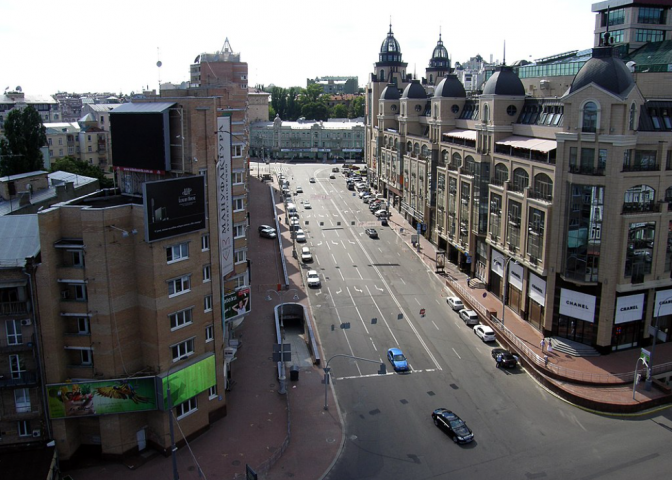
Skoropadskyi Street (de facto – a thoroughfare that was not renamed in honor of «San Sanych»)
Then the question arose that it was necessary to make a normal [Skoropadskyi] street, and the people of Kyiv decided that it would be Lev Tolstoy Street. In order to avoid duplication, it is necessary to remove one of those streets. Of course, it would be necessary to remove the one that was this «generous» gift of the Kuchma’s team. At the suggestion of the mayor of Kyiv, Vitalii Klychko, a letter was sent to the commission: if the renaming of Lev Tolstoy Street to Skoropadskyi Street is chosen, then give the people of Kyiv the opportunity to vote for the renaming of Skoropadskyi Street to Oleksandr Omelchenko Street. The people of Kyiv said quite firmly that this would not happen. Therefore, there will be no Omelchenko Street on the old Skoropadskyi Street at the moment, and the commission will continue to work to remove the dubbing.
Read also: Vitaliy Portnikov: «Ukrainians have always made their choice»
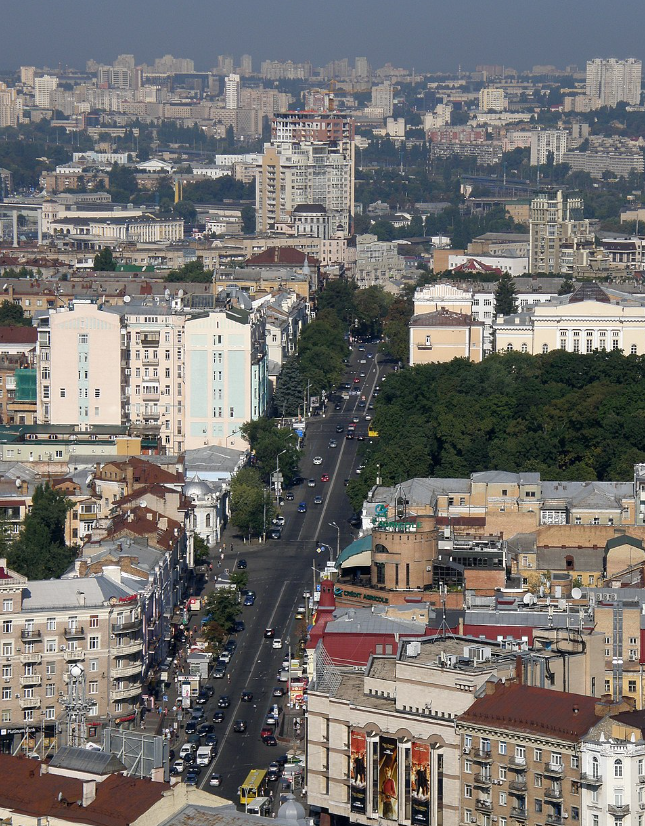
Lev Tolstoy Street (renamed in honor of Pavlo Skoropadskyi)
Now, regarding the monuments that are somehow related to the Russian Empire or its Soviet version – Shchors, Pushkin, Chkalov, and so on. They still remain on their pedestals, and it seems that this is more difficult to do than even in Kharkiv, in other cities where the majority in the city councils until recently was considered pro-Russian or insufficiently pro-Ukrainian. What is the problem? Who is slowing down this process – the Kyiv City State Administration or the Ministry of Culture?
Regarding the monuments, a commission was established. In it, I head a small expert group on working with monuments. 99% of the monuments and plaques included in this list must be removed from public view. According to my reasoning, they should have different future fates: some place in a museum, some – in private collections. But there can be neither Shchors nor Vatutins in Kyiv!
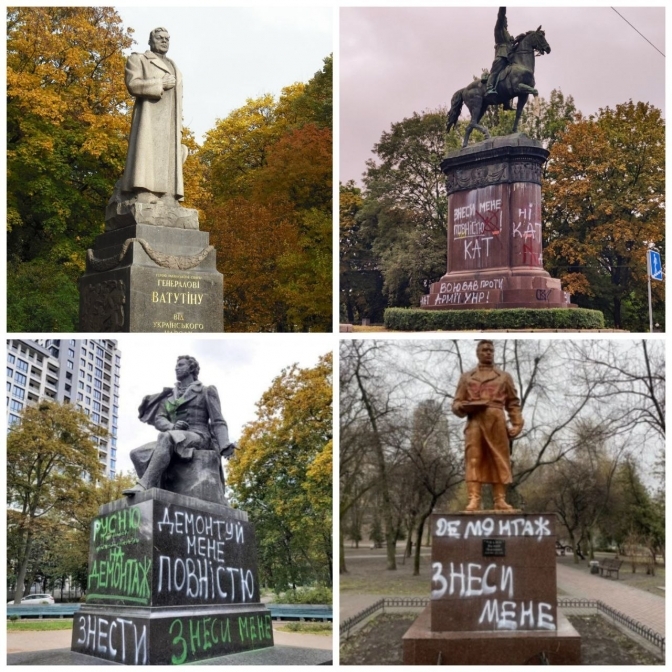
A comparison with Kharkiv is very valid. Now, there is a war in Ukraine, but many politicians live according to the laws of a non-martial state. When they say that the monument to Vatutin cannot be demolished, because it is a burial... Well, sorry, it’s a martial law. What if a missile takes it down tomorrow? You have to think with your head. We are observing certain options of blasphemy, we are now being forced to act in one way, but of course, we are demonstrating our Europeanness, our civilizational choice. Now it’s much easier and much faster to make different decisions based on people, as in our street expert commission. We have professionals who express their position. The same should be done with monuments, even though the situation with them is different, because many questions arise: how to dismantle, at whose expense to import, where to store, to whose balance should it be transferred. I want to tell you a secret: although they say that monuments are belong to different the responsibilities of different structures, the monument to Bohdan Khmelnytskyi in 1888 is not on any of them, just imagine. I’ve been thinking lately, maybe move it to my yard?
It has remained since the tsarist times, and is looking in the wrong direction. The Motherland monument is looking in the right direction [to the West], Khmelnytskyi – in the other one, it is probably necessary to «turn it around» a little. By the way, even a special vote was held for the Motherland in «DIIA» e-governance application, which I do not consider representative – any serious sociologist will confirm this, because there is a specific sample. But many people really believe that this is a new symbol of Ukraine. Instead, we all understand how it was designed and even stylistically, it is a monument to that totalitarian state. It actually symbolizes the Soviet Union, this empire. Is it possible to make such a travesty by sticking a trident, calling it something else, and it actually becomes one?
There are memories of the Motherland monument in my family. Parents remember carrying this huge head to put it in place. For me, a native of Kyiv, this was a sufficiently Soviet monument since childhood. Over time, I realized that this is a monument not only to the system, but also to the regime. Today, we can tear off the tiles from the houses of the so-called «Stalinist empire» style on Khreshchatyk, clean this Motherland-Mother [of the hammer and a sickle], but... this is one of the landscape complexes of Kyiv. I have often met foreigners, and many of them are eager to see this miracle of a totalitarian regime. It seems to me that here we need to shift the emphasis and, certainly, place them in the context of Ukrainian statehood. But I am not yet ready to accept the version that the Motherland should be removed from the hills of Kyiv. I understand that this creature wasn’t finished as a souvenir by the same professionals who started it, so in many respects, it has a rather unsophisticated, static appearance. But it is too early to talk about the dismantling of this statue, though it would be beautiful and appropriate to transform it with some Ukrainian variations.
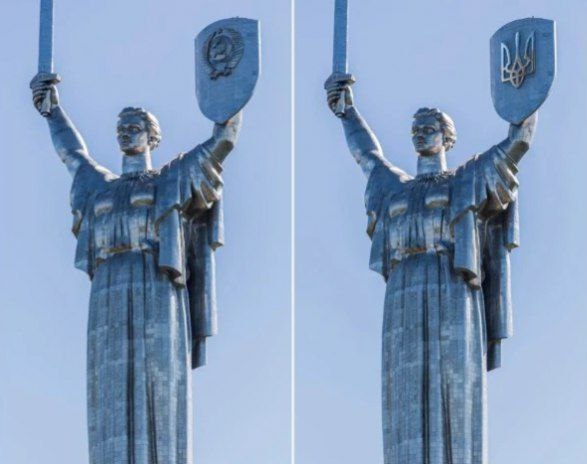
There are many versions regarding the renaming of the metro stations of «Lev Tolstoy», «Heroes of the Dniper», «Friendship of Nations», «Minsk», and «Beresteiska». Last spring, an online vote was held to consider their renaming. For example, regarding the renaming of «Beresteiska», the people of Kyiv chose the option «Buchanska» – this was precisely at the time when Bucha was and still is a hot topic. But the war continues. In your opinion, should the voting results be taken into account? And in general, how does this process move?
The situation with the names of Kyiv metro stations is as follows: there was a vote in a Google form, anyone could vote and express their «for» or «against». But I would like to warn that this vote was not verified, that is, a person could log in as many times as he wanted to the Google account and vote as many times as he wanted in this form. If, for example, Kremlin propagandists understood this situation, I am convinced that some bot farm would rename one station in honor of Moscow, the second – in honor of Minin and Pozharsky, and the third would be the «Pushkin» station. Unverified voting hid a huge danger. The name options that came up are the exposed nerve of society, people started talking about what hurts. But we live in a city that has a thousand-year history. This applies to every city that has ancient historical roots, and we must understand that we are responsible for creating a psychological landscape. In Kyiv, we recently «rejected» the renaming of the «Dorogozhichi» station, which is a historical name, to the «Babyn Yar» station. Imagine if there will be a station «Babyn Yar», «Bucha», «Defeat under Berestechko», «Chornobylska». You and I are ourselves spoil the atmosphere of perception of Kyiv as a capital city, we take upon ourselves the pain that we are trying to multiply in this way. In the subway, the doors are marked «Entrance» and «Exit». Previously, they wrote «There is no way out», which caused an increase in the number of suicides. People went to work in this «prison» in the 1990s and read the sign «There is no way out.»
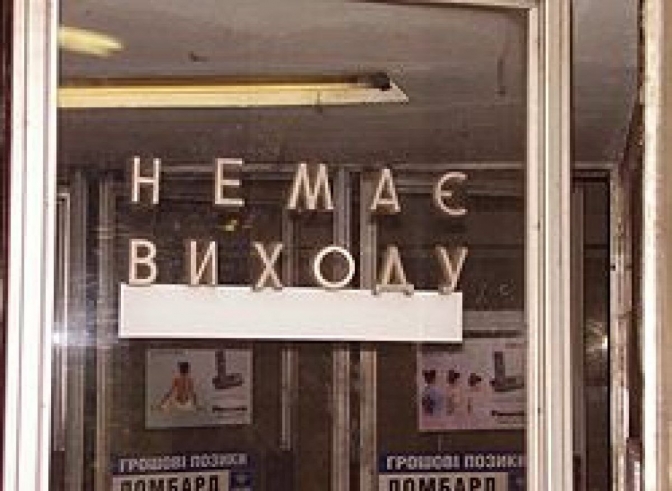
That is, we ourselves fill the content of the sacred plane, which should prevail over the situational. I apologize, but Bucha is a huge pain, though Baturyn of 1708 is also a pain, and no one mentions it anymore [Baturyn, then a capital of Ukrainian Hetman Ivan Mazepa, was brutally burned by the forces of Moscow tsar Peter I]. We say that the war is not over, that Chornobyl is a pain. But we live not in pain, but for the sake of children. For their sake, we have to reject the concept of snobbery, just as we rejected Catherine II, the «daughter of a bitch», as [Ukrainian writer, pioneer of modern Ukrainian literature] Ivan Kotlyarevskyi said about another heroine. We have to put aside sharp corners and work for children. Throw away ice cream for 16 coins or a loaf of bread for 16 coins, throw away everything that we drag with us. Our children should grow up in cities filled with Ukrainian or pan-European markers.
A brief clarification: the names of the streets have already been bound to the metro stations, the construction of which has just been planned – «Tsvetaeva», «Saburova», «Vatutina», «Perova». Almost all of them have been renamed, except for the Tsvetaeva station, which is another matter. Will this order change once they are not connected to the names of the streets?
In Kyiv, the following mechanism of action was created: there is no need to name stations after people, because this is a Soviet tradition. Therefore, the «Taras Shevchenko» metro station in our country marks neither Shevchenko Square, Shevchenko Boulevard, nor Shevchenko University. The situation is the same with the station «Lev Tolstoy Square», which is now called «Ukrainian Heroes Square».
Indeed, there are still project names of the Kyiv metro, which were established in the 1980s. There is a project metro station «Prospekt «Pravdy». This avenue was named after the Pravda (Truth) Soviet newspaper, not after some conventional «truth». And after decommunization in Kyiv, they removed the quotation marks from the name and said: «It’s just Truth Avenue.» It is clear that these are ideological things. And how to decommunize the monument to Lenin? Paint it blue-yellow? Well, it won’t work like that!
I am very glad that the people of Kyiv voted to rename the «Pravdy» Prospekt metro station project, which is the station that should be completed first of all, because it is almost ready, so that it will be named «Warshavska» in honor of the capital of our friendly country. Project names in general will change, and this is a huge role – to leave these toponyms in Kyiv, local names that are not tied to rivers, streets, or districts.
These are the names of localities that have disappeared, rivers that have disappeared, or are disappearing, or are in reservoirs. Therefore, metro stations should direct a guest of the capital or a resident of Kyiv to the exit to a certain location or «stick» him to historical memory. The «Druzhby Narodiv» metro station, which is now not on Druzhby Narodiv Boulevard, but on Mykola Mikhnovskyi Boulevard, will be renamed to «Zvirynetska» station. Perhaps someone who is not very smart does not like that he will live near the «Zvirynetska» metro station, because it is something that resembles a menagerie [zvirynets in Ukrainian]. Then let this «reasonable» person leave Kyiv, because he is a person who does not accept the name, which is thousand years old and which was lost in Kyiv in recent years. Here, one would either be an eternal guest and be silent, or leave the city. The task of our commissions regarding monuments and streets is completely different: we need to clean up and fill the streets and the landscape with real content, so that children can walk and develop normally, so that we no longer see such a shameful situation as Pushkin Street in the city center, where multi-story apartment buildings stand, and the street of the author of «Eneida» Ivan Kotlyarevskyi, where there are 21 houses of the private sector, or the street of the founder of Ukrainian prose, Kvitka-Osnovyanenko, where 50 houses in Mysholovka [area in the south of Kyiv] are in the private sector.
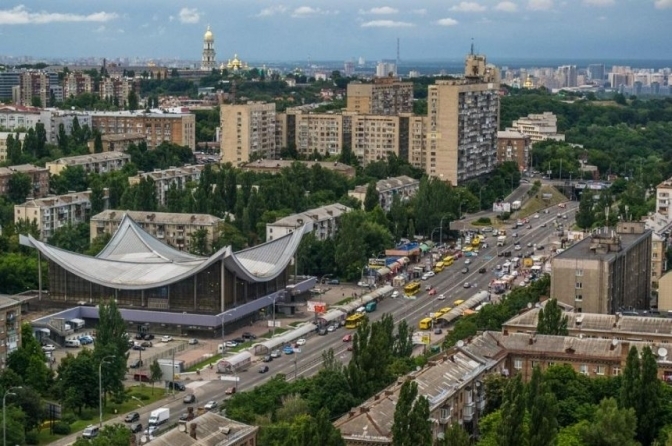
Mykola Mikhnovskyi Boulevard (Friendship of Nations)
Or Sverstyuka Street, which looks simply terrible. This is probably one of the most depressing small, bloody streets somewhere on the outskirts of Kyiv. I was on it by chance and thought: one should have tried to find such a street... The streets of Akhmatova, Tsvetaeva, Blok, Vysotsky, all those Russian poets, cultural figures – what about them?
This issue is related not to the policy of de-Russification, but specifically of de-imperialization. Do we perceive Anna Gorenko (Akhmatova) as a Ukrainian, a figure of the Silver Age in the Russian Empire, or as a Russian? Everything is very, very complicated here, and we have to think about it. I am not saying that our commission is a verdict for absolutely everything. In fact, we only moderate and guide people delegated by the Academy of Sciences from various institutes to one or another opinion based on professional characteristics. Therefore, it is still difficult to talk about cultural figures, but we have a principle: if this cultural figure is known only within the post-Soviet region, then it is obviously someone who was «pushed» to us from above.
Then let’s talk about an actor known throughout the world. This is Pyotr Ilyich Tchaikovsky, after whom the Kyiv conservatory is named. Musicians and employees of the music academy refuse to rename it. What is your position?
Pyotr Ilyich Tchaikovsky was originally Ukrainian. I don’t know if he had any anti-Ukrainian statements or activities. He is a world-renowned composer who arranged many Ukrainian folk melodies for his symphonies. We know this, although here they emphasize that Tchaikovsky is a marker of a such, let’s say, Russian identity specifically for the conservatory. Let’s look at the figure of Tchaikovsky: who he was, apart from his Ukrainian origin, according to national views. Is he really an anti-Ukrainian figure, or did he make fun of our Ukrainian music when he included it in his symphonies and works? Let’s give the floor to professionals in the history of music, but not in the history of politics. I would put this on hold for a circle of people to discuss these positions, because, you know, «the street» can often be wrong.
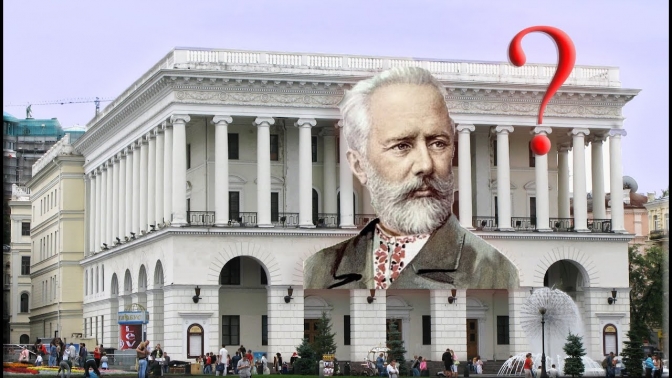
How many more streets are left to be renamed in terms of quantity or percentage?
In Kyiv, these numbers are simply colossal: 470 streets were submitted for renaming, to which Kyivans and citizens of Ukraine submitted more than 15,000 name options. And we needed to consider all these streets and options. Along with this, we were able to decolonize, de-Russify, and de-imperialize approximately 300 streets, more than three dozen managed to return their historical names. Work continues. Behind all this disparity, there will still be streets with «gray» names, such as Abrykosova (Apricot), Yahidna (Berry), Vyshneva (Cherry), Serdolikovykh and almost a thousand Sadova (Garden) streets, which tell that our entire country is in gardens.
I will allow myself one more question, which is important to me. In the last month, at least three publications appeared in The Guardian and Le Monde, which in one way or another criticized the narratives themselves, where there is a heroization of Bandera, the Ukrainian Insurgent Army (UPA), including in toponyms. The president of Poland – our greatest ally Andrzej Duda was greeted here like a rock star when he appeared incognito on the streets. But at the same time, we see that the Poles have unhealed wounds where we have almost none of them at the collective level.
What should we do with Bandera? Do we really have to somehow revise attitude to him, or do we still have to say that this is a conditional Pilsudski and insist that we have the right? There are Portuguese with their Salazar, and somehow they are not criticised much, while he had bigger problems than Bandera. What should we do with Bandera, with his legacy, which is now very relevant?
In fact, the issue is not in Bandera, not in the UPA, but in the fact that there are groups of historians from Ukraine and Poland who are interested in the conflict between themselves. Let’s honestly admit that we had a difficult XX century in the context of the 20s and 30s. I won’t talk about any secret world conspiracies, but I will say that some fellow historians said I was a traitor when my friends were guarding the Orlęta (Eagles) monuments [devoted to Polish military units in the XX century] a few years ago. They said I was a traitor because I wanted to talk about the tragedy in Volyn. Let’s stop being children! I understand that everyone got out of this stupid Sovietness, where you keep your mouth shut until the end... But it doesn’t work like that, we are adults, our lies cause other lies or other people’s lies cause ours. We must understand that we and Poland are united by the victory over the Bolshevik army. Let us explain to the whole world that we and Poland are now united by another future victory over the Bolshevik army. Let’s just remember that the Poles managed to understand the Katyn tragedy in the 1990s, because they did not know about it before, but learned about it at the end of the 1980s. I spoke to Polish officers who have good positions, and they said that it was true, because they simply did not read or write. In those families who learned about it...
We have the Holodomor, which became a universally recognized national tragedy only under Yushchenko’s presidency. And how many people there were who denied it. There were people whose relatives and ancestors died, and they proved that this did not happen. It’s a trauma, you can understand it...
Actually, historical memory is like that. The backbone of our historical memory is broken by the Holodomor and the Second World War. The Poles have it a little longer, from the 19th century. But if you do not tighten the historical memory, do not increase emotionality, then it can disappear. And when you don’t have your own state, although there is statehood, it is clear that this historical memory gains other indicators. The occupiers reminded us of the Battle of Borodino, the «Trouble Times» in the Moscow tsardom, Minin and Pozharsky. We were given another story about Peter I and his midshipmen, and so on.
In fact, this historical memory for the Poles and for us was largely restored in the last decades of the last century. And you and I now live and figure things out. It is better to look for when we were together and strong, than now to lie to each other, saying that we are the best in the world. Let’s honestly put dots over the «i» over those questions, let’s admit to each other that both they and we behaved wrongly in the 1920s and 30s, and let’s pass it as a lesson for all generations. If the Russian Federation disappears, breaks up into Dagestanis, Chechens, Buryats, then the Polish nation will not disappear and the Ukrainian nation will not disappear.
I think that the great Pole Karol Wojtyla, John Paul II, the Pope and a great friend of Ukraine, left behind a formula that can be used to reconcile Ukrainians and Poles. It sounds like this: «We forgive and ask for forgiveness.» I think this is a universal formula that should work in our story.
Andrii Saichuk spoke
Text: Marichka Ilyina, translated by Vitalii Holich
Follow us on Facebook and Instagram. Lviv Now is an English-language website for Lviv, Ukraine’s «tech-friendly cultural hub.» It is produced by Tvoe Misto («Your City») media-hub, which also hosts regular problem-solving public forums to benefit the city and its people.











